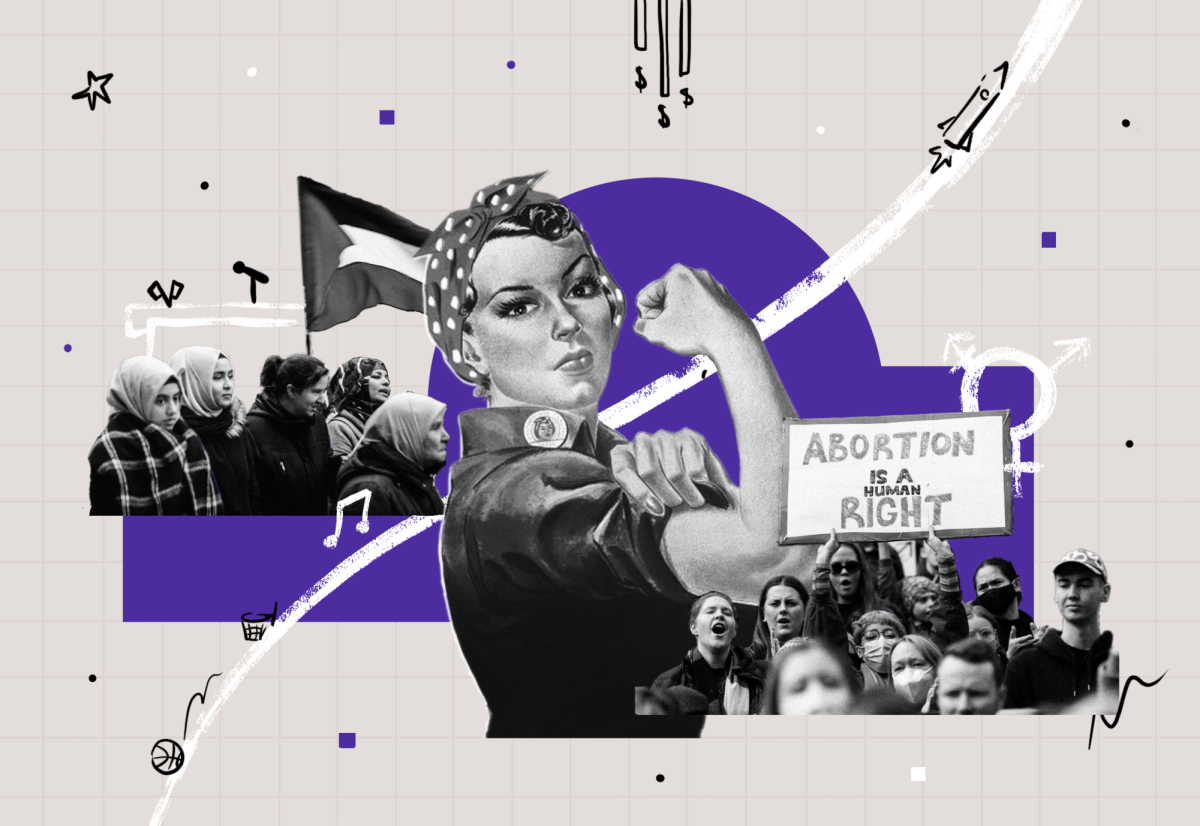March 2024 marked the 38th Annual Women’s History Month, first designated in 1987 via Congress’ Public Law 100-9. Prior to this, the celebration originated locally as Women’s History Week in 1978 in Santa Rosa, Calif. Starting yesterday, the U.S. also celebrates the 14th Annual National Women’s Health Month, first observed by the White House in 2010. With March now over and May beginning now, it’s as good a time as any to review what has happened regarding women’s rights, issues, and more.
Table of Contents
- Thousands of women have died in Gaza and other areas of crisis.
- Reproductive rights have come under attack in Virginia and remain highly contested across the U.S. and worldwide.
- Women are gaining ground in politics, particularly in Loudoun County.
- The gender pay gap is slowly closing.
- Women’s sports, basketball in particular, have surged and continue to surge in popularity.
- Transgender women continue to be the topic of much debate in sports.
- From “Barbie” to “Cowboy Carter,” women are making waves in pop culture.
- From space to business, women are setting firsts.
1. Thousands of women have died in Gaza and other areas of crisis.
The Gaza Strip is a Palestinian territory situated along the Mediterranean Sea, about twice the size of Washington D.C. For over six months now, the region has been rocked by violence amid the Israel-Hamas War, starting on October 7th last year when militant/terrorist group and current controlling political party Hamas attacked Israel, after decades of conflict in the region involving occupation, sanctions, and more.
Since Oct. 7, at least 35,088 Palestinians have been killed, including more than 8,400 women. UN Women estimates that this is closer to roughly 9,000 women, but that the actual figure is likely higher as many more are buried under the rubble. At the current rate, an average of 63 women are killed every day. Additionally, women are struggling with anything from starvation and sexual violence to a lack of menstrual products and maternity hospitals.
Violence has similarly affected women in Sudan, which has been caught in a civil war since April 2023. The Democratic Republic of the Congo is also facing a deepening humanitarian crisis amid increased internal and external (i.e. Rwanda) conflicts since 2022.
Notably, two of the women on the 2024 TIME Women of the Year list are involved with the crisis in Gaza. Yael Admi is a co-founder and leader of the Israeli movement Women Wage Peace, and Reem Hajajreh is the founder and director of the Palestinian organization Women of the Sun. The two are allied and both advocate for a mutually agreed upon, nonviolent resolution. Both were also nominated for the 2024 Nobel Peace Prize, to be announced in October.
2. Reproductive rights have come under attack in Virginia and remain highly contested across the U.S. and worldwide.
After the U.S. Supreme Court overturned Roe v. Wade in June 2022, many states have seen an increase in abortion bans and similar legislation. Such concerns were especially important last November when all seats for the Virginia General Assembly were on the ballot. Democrats campaigned on protecting abortion rights, and by the end, they had flipped the Senate and held the House, thus gaining full control of the General Assembly. In the Va. Senate, Democrats now hold 21 out of the 40 total seats. And, in the Va. House of Delegates, they hold 51 out of the 100.
Since then, Virginia has become an anomaly among the Southern states for its generally lenient attitude towards abortion. In February this year, a bipartisan House subcommittee vetoed a near-total abortion ban. And in early April, Republican Governor Glenn Youngkin signed legislation to protect menstrual health data. At the same time, however, he also vetoed legislation that would protect women and medical practitioners from potential extraditions, and legislation that would protect doctors performing legal abortion care from disciplinary action. It was “a mixed message,” one abortion rights group director said.
In related news, in early March, France also became the first country worldwide to include the right to abortion in its constitution.
3. Women are gaining ground in politics, particularly in Loudoun County.
In 2015, the United Nations (of which the U.S. is a permanent member) set forth an agenda of 17 Sustainable Development Goals. “We commit ourselves to working tirelessly for the full implementation of this Agenda by 2030,” the declaration reads. Part of these goals is to achieve gender equality, which includes gender parity in politics. Progress has been made since then, but we are still far from finished.
As a matter of fact, gender equality in the highest positions of power will not be reached for another 130 years, according to UN Women. This is despite efforts to encourage women into politics, for example, gender quotas. Currently, the U.S. legislature (which does not have gender quotas) has a notable percentage of females. 25% of senators and 29% of representatives are women, marking a near-record-high for the Senate (The record is 26%, set in 2021.) and a record-high for the House of Representatives.
In Loudoun County, women hold eight out of the nine School Board seats. They were all elected in November last year and were sworn in the following January. One of them, Dr. Linda Deans of the Broad Run District, is the first Black woman elected to the Board.
4. The gender pay gap is slowly closing.
Generally, women have always been paid less money than men doing the same jobs, a phenomenon known as the “gender pay gap.” This year, the uncontrolled pay gap, which covers all jobs and industries, is about 84 cents to the dollar. The controlled pay gap, however, which takes into account factors like education, experience, and job title could be as little as 99 cents to the dollar, according to a report by compensation management company Payscale.
Historically, efforts have been made to decrease the disparity, but work is not yet done. Two years ago, in 2022, President Joe Biden issued an executive order committing to eliminating discriminatory pay in the federal government. According to a White House Release, he “made good on that promise” in January of this year through a new rule on past pay consideration, a new proposal on pay equity and transparency, and new general guidance on compensation history.
5. Women’s sports, basketball in particular, have surged and continue to surge in popularity.
Women are gaining more and more recognition in the world of sports, with financial services company Deloitte predicting that women’s elite sports will generate upwards of $1 billion for the first time in 2024. Rising stars like University of Iowa basketball player Caitlin Clark have contributed to the popularity, with Clark setting records on the court and her games gaining record viewers. The WNBA also had their most-watched regular season in 21 years, while setting highs in digital platforms, social media engagement, and sports betting, too.
Similarly, Coco Gauff is gaining in women’s tennis. In September 2023, at just 19 years old, she won her first Grand Slam Championship at the U.S. Open. She is now one of the 2024 TIME Women of the Year and, according to Sportico, the top-earning female athlete in the world.
In other athletic news, in late March, ultrarunner, veterinarian, and mom Jasmin Paris became the first woman to complete the extreme Barkley Race. After bypassing the cryptic entry rules, she ran through 100 miles of rugged terrain and about 60,000 feet of ascent and descent, ultimately finishing within about a minute of 60 hours. She is now one of only 20 who have completed the race since 1989.
Also, in mid-April, two-time Olympic silver medalist Hellen Obiri won the Boston Marathon for the second year in a row. She is the first woman to repeat since 2005. The podium was a sweep for Kenyan women, with Obiri in first, Sharon Lokedi in second, and Edna Kiplagat in third.
6. Transgender women continue to be the topic of much debate in sports.
Transgender people are individuals who have a gender identity that is different from the one they were assigned at birth. Trans women in particular have been the target of much controversy over the years, particularly pertaining to their participation in women’s sports. Opponents say that they have an “unfair advantage,” while proponents say such an advantage is an inadequately researched generalization.
The former viewpoint is illustrated through Lia Thomas, a swimmer for the University of Pennsylvania’s women’s team. In March 2022, she became the first openly transgender athlete to win a Division I title in any sport. Now, two years later, 16 college athletes are suing the National Collegiate Athletic Association (NCAA) for violating their Title IX rights by allowing Thomas to compete. Title IX is a law protecting people from sex-based discrimination in federally funded education programs or activities.
Most recently in April, the National Association of Intercollegiate Athletics (NAIA) also banned all trans women from competing in sports. The NAIA is smaller than the NCAA with 241 relatively low-enrollment schools, instead of 1,098 member schools.
Across the U.S., half of all states have policies banning transgender students from participating in sports consistent with their gender identity (Virginia excluded). In late February, the U.S. also saw the conclusion of the first federal trial for a hate crime based on gender identity. Daqua Lameek Ritter, a South Carolina man, was found guilty of all charges related to the murder of Dime Doe, a transgender woman, in 2019.
7. From “Barbie” to “Cowboy Carter,” women are making waves in pop culture.
In February, TIME released its 2024 Women of the Year list. It featured Greta Gerwig, Taraji P. Henson, and Andra Day.
Gerwig is a writer, actress, director, and the first person to have her first three solo feature films (“Lady Bird,” “Little Women,” and “Barbie”) each nominated for “Best Picture” at the Academy Awards. In addition, “Barbie,” her latest movie released in July 2023, was nominated for seven other Oscars. However, many were upset when Gerwig wasn’t nominated for “Best Director” and star actress Margot Robbie wasn’t up for “Best Actress” – and even more upset when “Barbie” walked away with just one win for “Best Original Song.” Despite breaking box office records, the film did draw mixed reviews, mainly about its commentary on the patriarchy.
Henson is an actress and singer who has spoken out about her experience as a Black woman in the industry, specifically about the persisting pay gap. Most recently, she has featured in “The Color Purple” where she plays Shug Avery, a flamboyant blues singer who teaches her friend Celie to love herself, while also dealing with her own insecurities.
Day, like Henson, is also an actress and singer. She sang at Super Bowl LVIII and is also known for her 2015 song “Rise Up,” which became an anthem for Black Lives Matter. She also played Billie Holiday in the 2021 film “The United States vs. Billie Holiday,” which follows the jazz singer’s career as an activist, victim of abuse and addiction, and someone persecuted by the government.
In other pop culture news, in April 2024, Beyoncé’s “Cowboy Carter” became the No. 1 album on the Billboard 200 and Billboard Top Country Albums, making her the first Black woman to hold the latter. Taylor Swift was also the 2023 TIME Person of the Year. Her much-anticipated 11th studio album, “The Tortured Poets Department,” also released April 19.
8. From space to business, women are setting firsts.
Amanda Nguyễn is set to become the first Vietnamese woman in space. She studied national security and astrophysics at Harvard University, but after being sexually assaulted in 2013, she paused her dreams of being an astronaut to become an activist. Congress unanimously passed her legislation and the United Nations unanimously adopted her resolution, protecting the rights of sexual assault survivors. Nguyễn also founded the nonprofit Rise, was nominated for the 2019 Nobel Peace Prize, and is a 2022 TIME Woman of the Year.
Additionally, starting this month, Anastasia Nyrkovskaya will be the first female CEO of the business media company Fortune, stepping up from her previous role as chief finance and strategy officer. She started her career with finance firm KPMG and later assumed leadership positions at other companies, including media company NBCUniversal. Three years ago, Fortune also appointed its first female editor-in-chief, Alyson Shontell.
Conclusion
All in all, it’s clear that women have had a big impact in so many areas. More women are politically involved, more people are watching women’s sports, more music and movies focus on women, and more positions are featuring women.
However, it’s also clear that there is still work to be done in order to achieve full equality and peace. This is especially true with regard to war/crisis, reproductive rights, the gender pay gap, and transgender women in sports.
Although March has come and gone, it’s important to keep up with discussions like these year-round, not just during or around Women’s History Month or Women’s Health Month. Women, and all marginalized populations, deserve the world — and to ensure one in which they have that, it takes us all.
























![The Phoenix varsity volleyball team lines up for the national anthem. “We were more communicative [with each other] during this game, and I feel like we kept our energy up, especially after the first set,” senior Jessica Valdov said.](https://theblazerrhs.com/wp-content/uploads/2024/10/DSC_0202-1200x800.jpg)










![Junior Alex Alkhal pitches the ball. “[I] just let it go and keep practicing so we can focus on our goal for the next game to get better as a team,” Alkhal said.](https://theblazerrhs.com/wp-content/uploads/2025/05/DSC_0013-1-1200x929.jpg)





















